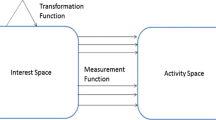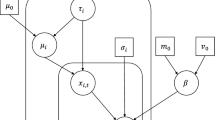Abstract
Since a social network, by definition, is so diverse, the problem of estimating the preferences of its users is becoming increasingly essential for personalized applications which range from service recommender systems to the targeted advertising of services. However, unlike traditional estimation problems where the underlying target distribution is stationary, estimating a user’s interests, typically, involves non-stationary distributions. The consequent time varying nature of the distribution to be tracked imposes stringent constraints on the “unlearning” capabilities of the estimator used. Therefore, resorting to strong estimators that converge with probability 1 is inefficient since they rely on the assumption that the distribution of the user’s preferences is stationary. In this vein, we propose to use a family of stochastic-learning based Weak estimators for learning and tracking user’s time varying interests. Experimental results demonstrate that our proposed paradigm outperforms some of the traditional legacy approaches that represent the state-of-the-art.
Access this chapter
Tax calculation will be finalised at checkout
Purchases are for personal use only
Preview
Unable to display preview. Download preview PDF.
Similar content being viewed by others
References
Basseville, M., Nikiforov, I.V.: Detection of abrupt changes: theory and application. Prentice-Hall, Inc. (1993)
Godoy, D., Amandi, A.: User profiling in personal information agents: a survey. Knowl. Eng. Rev. 20, 329–361 (2005)
Godoy, D., Schiaffino, S., Amandi, A.: Interface agents personalizing web-based tasks. Cognitive Systems Research, Special Issue on Intelligent Agents and Data Mining for Cognitive Systems 5(3), 207–222 (2004)
Hossain, M.A., Atrey, P.K., El Saddik, A.: Gain-based selection of ambient media services in pervasive environments. Mob. Netw. Appl. 13(6), 599–613 (2008)
Hossain, M.A., Parra, J., Atrey, P.K., El Saddik, A.: A framework for human-centered provisioning of ambient media services. Multimedia Tools and Applications 44, 407–431 (2009)
Koychev, I.: Gradual forgetting for adaptation to concept drift. In: Proceedings of ECAI 2000 Workshop Current Issues in Spatio-Temporal Reasoning, pp. 101–106 (2000)
Koychev, I., Lothian, R.: Tracking drifting concepts by time window optimisation. In: Bramer, M., Coenen, F., Allen, T. (eds.) Research and Development in Intelligent Systems XXII, pp. 46–59. Springer, London (2006)
Koychev, I., Schwab, I.: Adaptation to drifting user’s interests. In: Proceedings of ECML 2000 Workshop: Machine Learning in New Information Age, pp. 39–46 (2000)
Maloof, M.A., Michalski, R.S.: Selecting examples for partial memory learning. Machine Learning 41, 27–52 (2000)
Middleton, S.E., Shadbolt, N.R., De Roure, D.C.: Ontological user profiling in recommender systems. ACM Trans. Inf. Syst. 22(1), 54–88 (2004)
Mitchell, T.M., Caruana, R., Freitag, D., McDermott, J., Zabowski, D.: Experience with a learning personal assistant. Commun. ACM 37(7), 80–91 (1994)
Montaner, M., Lpez, B., de la Rosa, J.L.: A taxonomy of recommender agents on the internet. Artificial Intelligence Review 19, 285–330 (2003)
Narendra, K.S., Thathachar, M.A.L.: Learning Automata: An Introduction. Prentice Hall (1989)
Naudet, Y., Aghasaryanb, A., Mignon, S., Toms, Y., Senot, C.: Ontology-Based Profiling and Recommendations for Mobile TV. In: Wallace, M., Anagnostopoulos, I.E., Mylonas, P., Bielikova, M. (eds.) Semantics in Adaptive and Personalized Services. SCI, vol. 279, pp. 23–48. Springer, Heidelberg (2010)
Oommen, B.J., Misra, S.: Fault-tolerant routing in adversarial mobile ad hoc networks: an efficient route estimation scheme for non-stationary environments. Telecommunication Systems 44, 159–169 (2010), 10.1007/s11235-009-9215-4
Oommen, B.J., Rueda, L.: Stochastic learning-based weak estimation of multinomial random variables and its applications to pattern recognition in non-stationary environments. Pattern Recogn. 39(3), 328–341 (2006)
Rueda, L., Oommen, B.J.: Stochastic automata-based estimators for adaptively compressing files with nonstationary distributions. IEEE Transactions on Systems, Man, and Cybernetics, Part B: Cybernetics 36(5), 1196–1200 (2006)
Shiryayev, A.N.: Optimal Stopping Rules. Springer, Heidelberg (1978)
Stensby, A., Oommen, B.J., Granmo, O.-C.: Language Detection and Tracking in Multilingual Documents Using Weak Estimators. In: Hancock, E.R., Wilson, R.C., Windeatt, T., Ulusoy, I., Escolano, F. (eds.) SSPR&SPR 2010. LNCS, vol. 6218, pp. 600–609. Springer, Heidelberg (2010)
Thathachar, M.A.L., Sastry, P.S.: Networks of Learning Automata: Techniques for Online Stochastic Optimization. Kluwer Academic Publishers (2004)
Widmer, G.: Tracking context changes through meta-learning. Mach. Learn. 27(3), 259–286 (1997)
Yazidi, A., Granmo, O.C., Oommen, B.J.: An adaptive approach to learning the preferences of users in a social network using weak estimators. Unabridged version of this paper (submitted for publication)
Yu, Z., Zhou, X., Zhang, D., Chin, C.Y., Wang, X., Men, J.: Supporting context-aware media recommendations for smart phones. IEEE Pervasive Computing 5, 68–75 (2006)
Author information
Authors and Affiliations
Editor information
Editors and Affiliations
Rights and permissions
Copyright information
© 2011 Springer-Verlag Berlin Heidelberg
About this paper
Cite this paper
Yazidi, A., Granmo, OC., Oommen, B.J. (2011). Tracking the Preferences of Users Using Weak Estimators. In: Wang, D., Reynolds, M. (eds) AI 2011: Advances in Artificial Intelligence. AI 2011. Lecture Notes in Computer Science(), vol 7106. Springer, Berlin, Heidelberg. https://doi.org/10.1007/978-3-642-25832-9_81
Download citation
DOI: https://doi.org/10.1007/978-3-642-25832-9_81
Publisher Name: Springer, Berlin, Heidelberg
Print ISBN: 978-3-642-25831-2
Online ISBN: 978-3-642-25832-9
eBook Packages: Computer ScienceComputer Science (R0)





